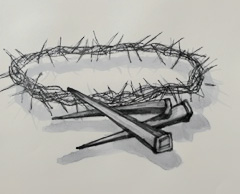“Now faith is the assurance of things hoped for, the conviction of things not seen.”
Hebrews 11:1 (RSV)
There are three words that I say way too often, which are not of faith, and definitely not pleasing to God. No, they’re not swear words, although I am guilty of that too. It’s the three word phrase,
“I give up.” Whenever I become overwhelmed and frustrated, it’s the first phrase that flies out of my mouth. It’s worse than swearing because it’s an expression of total faithlessness coming straight from the heart, through my lips. I try to catch myself before saying it, but it still slips out.
God rewards faith, but He doesn’t reward giving up. The phrase “I give up” doesn’t even exist in the language of faith, because it’s a language of heroes.
There are many kinds of heroes to admire. There are war heroes, civil rights heroes, first responder heroes, sports heroes, Super Bowl heroes and not one of them utters the phrase “I give up.” Heroes of faith are believers who speak the language of faith fluently. They believe, speak and act in faith, not based on what they see, but on what is unseen.
The 11th chapter of Hebrews is known as the “Hall of Faith” chapter. By reading the 40 verses of this chapter, it summarizes the heroes of faith throughout the bible, and the words “I give up” were never part of their vocabulary.
By faith, Noah started a massive building project to save him and his family from a destructive flood that God warned him of. Building the ark took a lot of work, sweat, and perseverance, while the whole time, Noah’s neighbors mocked him daily, since there wasn’t a cloud in the sky. In spite of it all, Noah never said “I give up.”
By faith, after hearing God call him out, Abraham left his home town to travel to a new “promised land” where his descendants would form a brand new nation. He had no idea where that promised land was, but he started walking anyway. Then he married Sarah and believed God, waiting for descendants until he was 100 years old, and finally had a son of his own. In all those years, Abraham never said “I give up.”
Moses’ mother hid her baby boy at home for the first three months, from Pharaoh’s assassins, but she finally decided it was safer to place him in a waterproof basket, and send him floating down the Nile River. Three month old baby Moses looked at his mother from inside the basket, with his arms outstretched, but to save his life, she sent him down the Nile River, by faith, and never once said,
“I give up.”
Joshua followed God’s unusual orders to march around the walls of Jericho, blowing ram’s horns for seven days and then give a victory shout. After marching six times around, nothing happened, but on the seventh day, the ground opened up and the walls collapsed straight into the ground. Archeologists found the ancient remnants of the city of Jericho and the relics of the walls give evidence that the ground opened up and the walls fell straight down into the earth, instead of falling outward. Thankfully, Joshua never said, “I give up.”
I may sound redundant but it’s to inspire my own faith, so that I would speak the language of faith more fluently. It’s a language that is foreign to carnal minds, since carnal minds live by their senses. If I believe only what my senses perceive, through hearing, sight taste, touch or smell, then no faith is involved.
Faith has nothing to do with our senses, because faith is the assurance of what is not seen, nor what is heard, tasted, touched or smelled. Faith speaks into being, what we don’t see, because it originates within our spirit, not our mind. Jesus often said, “Your faith has made you well,” or “Be it done according to your faith.” Faith accomplishes what the natural mind cannot, and it’s a language that every human being can speak, though at different levels of fluency.
The beauty of faith is that it’s a language that turns God’s head, raises His eyebrows and makes Him smile. We know this because that’s how Jesus responded to people of faith that He met. It’s a language that also calms storms, moves mountains and resurrects the dead. Knowing how pleasing our faith is to God, that should forever motivate us. In the faith chapter we are told,
“Without faith it is impossible to please Him, for anyone who approaches God must believe that He exists and that He rewards those who seek him.” (Hebrews 11:6)
Many heroes of faith endured mockery, torture, imprisonment or death. Some were delivered before being killed, and others refused deliverance, in order to obtain an eternal reward. Despite the challenge, heroes of faith left an example for us to follow. They lived and spoke the language of faith, inspiring us to “Never give up!”
Lord, teach us the language and vocabulary of an enduring faith that won’t give up, that is storm proof, fear proof and reaps eternal rewards. Amen

